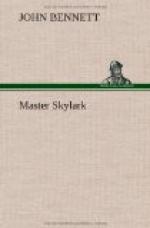At first his head felt stuffed like a feasted glutton with all the learning that the old precentor poured into it; but by and by he found it plain enough, and no very difficult thing to follow up the prickings in the paper with his voice, and to sing parts written at fifths and fourths and thirds with other voices as easily as to carry a song alone. But still he sang best his own unpointed songs, the call and challenge of the throstle and the merle, the morning glory of the lark, songs that were impossible to write. And those were the songs that the precentor was at the greatest pains to have him sing in perfect tones, making him open his mouth like a little round and let the music float out of itself.
Like the master-player, nothing short of perfection pleased old Nathaniel Gyles, and Nick’s voice often wavered with sheer weariness as he ran his endless scales and sang absurd fa-la-la-las while his teacher beat the time in the air with his lean forefinger like a grim automaton.
The old man, too, was chary of his praise, though Nick tried hard to please him, and it was only by little things he told his satisfaction. He touzed the ears of the other boys, and sometimes smartly thumped their crowns; but with Nick he only nipped his ruddy cheek between his thumb and finger, or laid his hand upon his shoulder when the hard day’s work was done, saying, “Satis cantorum—it is enough. Now be off to thy nest, sir; and do not forget to wash thy throat with good cold water every day.”
* * * * *
All this time the busy sand kept running in the glass. July was gone, and August at its heels. The hot breath of the summer had cooled, and the sun no longer burned the face when it came in through the windows. Nick often shut his eyes and let the warm light fall upon his closed lids. It made a ruddy glow like the wild red poppies that grow in the pale green rye. In fancy he could almost smell the queer, rancid odor of the crimson bloom crushed beneath the feet of the farmers’ boys who cut the butter-yellow mustard from among the bearded grain.
“Heigh-ho and alackaday!” thought Nick. “It is better in the country than in town!” For there was no smell in all the town like the clean, sweet smell of the open fields just after a summer rain, no colors like the bright heart’s-ease and none-so-pretty, or the honeysuckle over the cottage door, and no song ever to be heard among the sooty chimney-pots like the song of the throstle piping to the daisies on the hill.
But he had little time to dream such dreams, for every day from four to six o’clock the children’s company played and sang in public, at their own school-hall, or in the courtyard of the Mitre Inn on Bread street near St. Paul’s.
They were the pets of London town, and their playing-place was thronged day after day. For the bright young faces and sweet, unbroken voices of the richly costumed lads made a spot in sordid London life like a pot of posies in a window on a dark street; so that both the high and the low, the rich and the poor, came in to see them play and dance, to hear them sing, and to laugh again at the witty things which were written for them to say.




